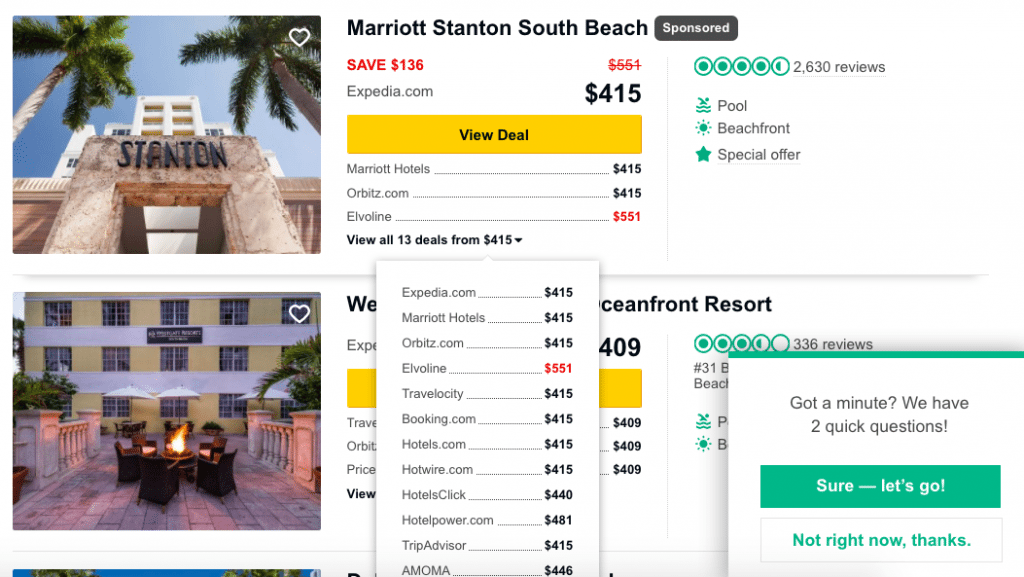Skift Take
Hotels — 10,000 of them — have voted with their feet, or advertising budgets, that is, and are trying out TripAdvisor's new sponsored listings program. The bottom line is the success or failure of the program will depend on how it impacts advertisers' bottom lines.
For years, the only way to ensure a hotel ascended to the top of a TripAdvisor page was to have great user reviews, and available rooms at competitive rates.
That’s changing as TripAdvisor on Tuesday officially launched Sponsored Placements for any hotel with available rooms that is willing to set an advertising budget, and is a member of the TripAdvisor’s subscription Business Advantage program.
With the rollout, which is global, a hotel such as La Quinta Inn & Suites, which is ranked 12th out of 14 hotels in Stamford, Connecticut, could buy a sponsored advertisement atop TripAdvisor’s page for that city. TripAdvisor labels these advertisements as “Sponsored.”
La Quinta’s Stamford property had a sponsored advertisement on top of TripAdvisor’s Stamford hotels page Monday morning. The property’s general manager declined to comment on the campaign, saying that the hotel is corporate-owned and placements like these are usually handled by the chain.
TripAdvisor introduced a similar program for its restaurant listings last year, and envisions expanding Sponsored Placement beyond hotels, as well. The sponsored restaurant listings have done well, but are starting from a much smaller base than what’s expected for hotels, a spokesperson said.
TripAdvisor said more than 10,000 property owners in 5,500 markets have run campaigns since Tripadvisor introduced the sponsored ads in a beta around three months ago.
“I think this is going to be really good financially for the company as another revenue stream over the next several years in restaurants and hotels, and hopefully some other categories, too,” CEO Stephen Kaufer told Skift.
Although the company has struggled in the last couple of years with the rollout of its hotel comparison-shopping service, TripAdvisor is still a must-have marketing component for hotels. The company cites a 2017 comScore study done for TripAdvisor that found that 60 percent of hotel bookers worldwide visit TripAdvisor before booking a stay.
Click-based advertising and transaction revenue (a combined $756 million) from TripAdvisor-branded sites was the largest component of TripAdvisor revenue in 2017; followed by revenue from attractions, restaurants and vacation rentals ($360 million); display advertising and subscription revenue ($293 million) from TripAdvisor-branded sites; and other hotel revenue ($148 million), which includes click-based, display and transaction revenue from sites that aren’t TripAdvisor-branded.
CEO Kaufer acknowledged that the only way to get discovered on TripAdvisor in the past was for the property to improve “your service, and have happy guests, which is still the backbone of the company now.”
“But someone who has an amazing property on page two — maybe they’re number 25 in Paris — can now be discovered on that first page, nice and visible,” Kaufer said.
Of course, a property that is rated 500th of more than 1,800 hotels in Paris, in theory, may be able to buy an ad to get the prime listing, too.
Not a Game-Changer
To be clear, sponsored listings are nothing new in online travel; Expedia has had a similar program, Travel Ads, for years. But these sponsored ads are new for TripAdvisor. Previously, there was an advertising slot that rotated among Business Advantage subscribers, but “it wasn’t contextual,” Kaufer said. “It didn’t respond to the various filters we have now. Now we’ve turned this into a full-fledged, click-based product offering that has to match the criteria that users are looking for.”
The clicks roughly cost in the $1 to $3 range; advertisers set a monthly budget, such as $5,000, and then TripAdvisor backs into a cost-per click, officials said. They added they expect the program to evolve into more of an auction-based program with varying costs-per click.
“The cost-per-click rate of $1 to $3 is a decent price, especially considering you are getting a premium inventory with a highly targeted audience,” said Skift Research Director Haixia Wang. “Still, the ultimate success metric should always be conversion to sales minus cost, advertising as well as commissions to third-parties.”
The way the ad works is that a property gets a listing labeled Sponsored atop a TripAdvisor page — placements elsewhere will be available, too — such as the one shown above for the Marriott Stanton South Beach in Florida. Consumers can click on the hotel listing and navigate to its TripAdvisor property page for more information, or they can select one of the third-party links from various online travel agencies without clicking to the property page. But, in the latter case, the hotel may still get a booking when it might not have had much visibility previously.
TripAdvisor officials said more than 70 percent of the clicks from the sponsored listing go to the hotel’s TripAdvisor property page. But from there, consumers again have the choice to book directly with the hotel or they can choose to book with various online travel agencies such as Expedia.com, Orbitz.com or Booking.com, for example.
Is it worth it?
But is it worth it for hotels to pay for an advertisement atop a TripAdvisor page and then to see the booking go to an online travel agency?
Sometimes yes, sometimes no. It all depends on the return on investment, said Flo Lugli, founder of Navesink Advisory Group, a digital and hospitality consultancy.
“In my view, if a property has a specific need period and can offer something that would entice a consumer to click to see the deals page, then it might be useful,” Lugli said. “But paying a CPC fee to get to a property page and then have the consumer link off to another booking channel via the meta links, to me, makes little sense. I would counsel any hotel to carefully measure the ROI for this product. Test and learn is critical as new advertising options are rolled out.”
Another advertising executive, who declined to be identified, had a somewhat different take on TripAdvisor’s Sponsored Placements.
“Most advertisers are unlikely to get many direct bookings,” he said. “My guess is that the mix would mirror the advertiser’s non-sponsored mix of direct versus third-party bookings from TripAdvisor, and we all know that the online travel agencies dominate this. That being said, if the advertiser is getting incremental bookings because of the increased exposure, that’s a win even if it the booking comes from a third party with high costs of distribution.”
On the other hand, the advertising executive said, “it’s a super-win if it’s incremental and direct.”
Thus, the value of the program — or the lack thereof —will be up to hotels to decide on a case by case basis.
Have a confidential tip for Skift? Get in touch
Tags: advertising, ceo interviews, marketing, metasearch, tripadvisor
Photo credit: TripAdvisor CEO Stephen Kaufer has big expectations for a new advertising program, Sponsored Placements. He spoke at the Skift Global Forum in New York in September 2017. Skift

